- Home
- Zellmann, William
Man's Hope
Man's Hope Read online
Man's Hope
Zellmann, William
~~~~ Man's Hope By William Zellmann ~~~~
Text Copyright © 2012 William Zellmann All rights reserved
~~~~ With thanks to Steve for his special help ~~~~
Table of contents
Table of contents
Chapter 1
Chapter 2
Chapter 3
Chapter 4
Chapter 5
Chapter 6
Chapter 7
Chapter 8
Chapter 9
Chapter 10
Chapter 11
Chapter 12
Chapter 13
About the Author . . .
Chapter 1
Colonel David Tarrant, U.S. Air Force, gazed out the window of the Jollibee fast food restaurant, munching on his odd-tasting hamburger and deciding that he liked the Philippines.
Oh, it was a third world country, with all the poverty that entailed, the hungry from the provinces escaping to the cities, where they became 'squatters', building scrap metal and wood shacks in any unused space and struggling to scrape up a few pesos to feed their families. If they were lucky, they might get jobs as domestic servants for those more prosperous, earning the equivalent of $70 per month. And there was the crowding, of course. The Philippines is comprised of over 7100 islands, but the total land mass is only slightly larger than Arizona, and is occupied by over 90 million people
However, there was none of the hopelessness, the grimness found in most third world countries. For the most part, Filipinos were cheerful, smiling people, friendly to strangers, especially the westerners they called "Kanos." The government billed the Philippines as the "third largest English-speaking country in the world," after the United States and Australia. The schools here taught in English, and it amused David to see how some Filipinos delighted in trotting out their English, while others, perhaps lacking confidence in their ability, refused to try to speak it at all. Even after only a few days, David could feel the vitality, the confidence, of the people.
But he gazed out the window because he was fascinated by the traffic. Someone had once described Manila traffic to David as "five lanes of traffic on a two-lane street"; and that was not far wrong, even here in Subic City. Lane markings on the streets, where they existed, were ignored. If a driver left so much as two feet between himself and the car ahead, a motorcycle or tricycle was certain to pull into it, or a taxi or jeepney to try to nose in. And if a stop light had all the lanes blocked, three or four cars, jeepneys, or even buses were certain to just swing out into the oncoming lanes, then try to squeeze back when the light changed. It was fascinating to watch.
Just as fascinating was the dizzying variety of vehicles; everything from bicycles, to the bicycles-cum-sidecar called "pedicycles", to the motorcycles, or "single motors", to the "tricycles", motorcycles mounting oversized sidecars. There seemed to be thousands of them that functioned as short-trip taxis. Then there were the usual cars including hundreds of taxicabs, the strange oversized replicas of old-model jeeps called "jeepneys" that functioned as small buses, trucks, of course, and huge buses, of the style used for tourism in the States. Here, they were used for local routes as well.
David was so engrossed in watching the amazing traffic dance that he did not notice the Philippine National Police Sergeant until he approached David's table. He looked up, surprised.
"May I see your passport please, sir?" the sergeant asked in fluent, if accented, English.
David nodded. "Of course, sergeant," he replied. He reached into his wallet and produced his military ID card and leave papers. Thanks to a Status of Forces agreement, active duty U.S. military personnel did not require a passport to visit the Philippines. David's ID card and leave papers were acceptable.
The sergeant examined the card and papers. Then he made a small hand signal, and a man David had not noticed before rose from a nearby table and approached. He was a middle-aged white man of medium height and weight, well dressed for the Philippines in cargo shorts, sandals, and a button-front shirt. The man also examined David's ID, and then he tossed it onto the table in front of David, and pulled up a chair on the opposite side of the table. "Salamat po, Toro," the man said, "I think he's all right. Tell Marco he can go home. I'm sure Inday has work for him to do."
The sergeant chuckled. "I am certain she does, tito Frank." He sobered. "I could stick around for a while if you would like."
The man shook his head. "Thank you again, Toro, but I don't think that will be necessary." He pulled some folded bills from his pocket, and peeled off several of them. "Would you give these to Marco and the people that reported, please? Thanks."
The sergeant smiled. "As you wish, tito Frank." He walked away, and the white man turned to David.
David smiled. "Francis Weatherly, I presume?"
The man scowled. "All right, Colonel, the only interest the U. S. Government has in me is that I have almost as much money as they do, and they want it. So, why track me down, and how did you do it?" He shook his head. "I went to a great deal of trouble to make sure no one could find me. Now, I suppose I'll have to find another sanctuary."
David slid his ID and leave papers back into his wallet, and buttoned it into his back pocket. "I'm not here on government business, Mr. Weatherly. And you did a very good job of disappearing; I lost you for two weeks in Rome. Coming the long way around via Europe was very clever. Actually, I got lucky. I googled you and it reminded me that your wife was a Filipina. I was stationed at Clark Air Base for a while before they ran us out, and I remembered how strong the family is in the PI." He gestured toward the departed PNP sergeant. "I see it still is. I thought all the billionaires lived in palaces or penthouses with hundreds of guards all around."
The man grunted. "That sound like fun to you?"
"Hell no. It would drive me crazy."
The man shrugged. "Me too. I'd rather sneak around and hide among my wife's family." He waved vaguely after the departing policeman. "That young man is my son-in-law. One of them." The man smiled as he continued, "Of course there are dozens of aunts, uncles, cousins, and other assorted 'family' in the area as well, even though my wife died ten years ago. I heard about it as soon as you mentioned my name the first time." The smile faded. "Now, yes, I'm Frank Weatherly. And it's time for you to tell me who you are and what you want."
David put on a hurt look. "I'm surprised you didn't recognize the name."
Frank frowned. "David Tarrant . . . David . . . The astronaut?"
David nodded. "That's right. Ex-astronaut, actually. I have been told I've flown my last mission. In two weeks, I'm to report to my new command. It was supposed to be command of an operational air group in the sandbox, but suddenly a "high priority" slot came up. A desk job at the pentagon, where I can be trotted out to impress senators at appropriation time. Just what I always wanted," he finished bitterly.
He shook his head as if coming back from a dream. "So," he resumed, "I'm a washed-up astronaut whose greatest ambition is to get back into space, and you, sir, may be the man who can help me do it." He leaned forward intently. "I know a lot about you, sir," he said. "You've been a space freak like me since longer than I've been alive. You also single-handedly built one of the largest mainframe computer companies in the world, and invested millions in space-related tech companies. Two years ago, your board of directors staged a hostile takeover, and threw you out with a billion-dollar golden parachute. Not that you needed it; you already had several billions of your own. Since then, you established that bogus foundation to draw off the fortune hunters, and simply disappeared. It's not my field, but I'm told you've been slowly and quietly moving your investments out of the U.S. and Europe, and into Asian economies. I don't think the government appr
oves of that very much."
Frank shrugged. "Okay, so you read Forbes. I guess it could be worse; you could get your information from People, or worse yet, the Inquirer." He lifted his cell phone, dialed, and then hesitated. "Tonio? Pick us up in front of Jollibee." He put the phone away, and turned back to David. "All right, Colonel, your name has bought you some of my time. Come along."
Without waiting to see if David followed, Frank got up and headed for the door, just as a small SUV pulled to a stop in the middle of the street. David picked up his laptop case and followed. Frank opened the back door, and they got in. The door closed with a heavy thunk. David raised an eyebrow. "Bulletproof?"
Frank shrugged and nodded. "There are still NPA in the area, as well as the usual assortment of creeps and thugs. I'm a good target for a kidnap. So I have to take precautions. It's one reason I wanted to get out of Jollibee so quickly."
David looked puzzled. "I thought the Philippine government had that stuff under control here."
"For the most part, they do. But I'm a very tempting target for a criminal gang that can claim to be a 'peoples' army' long enough to collect a fat ransom." He leaned forward. "Take us to the compound, Tonio."
He turned back to David as the SUV pulled away. "I'm pretty well covered, here. My wife's family is from this area. Besides, not many people know what I look like. Still, I'm a Kano, so I stick out. That means I have to take precautions, and not just from NPA. The damned reporters and photographers are even worse. I can buy off the NPA for a few hundred pesos and a bag of rice. But some of the reporters think they're on a holy mission, or something."
David's mind was only half on what Frank was saying. The rest of his mind was devoted to watching Tonio force the SUV through the traffic of Subic City. It was amazing. There did not appear to be any traffic laws at all. People moved from lane to lane, and if there was no lane, they created one by squeezing between two vehicles careless enough to leave an inch of clearance. The congestion was worse than rush hour in Houston, and they would creep along for a few minutes, bumper to bumper. Then, suddenly, for no apparent reason, the traffic would suddenly clear, and they would roar down the street for a block or two, until they encountered another jam.
Finally, though, the traffic began to thin somewhat as they left the city. The road became a narrow two-lane, with stalls and houses running right up to the pavement and people and animals walking on it. Most of the traffic now was motorcycles, tricycles and jeepneys, and even here, the tricycles and jeepneys would simply stop in the traffic lane to pick up or drop off passengers.
Finally, not far past a weathered sign proclaiming "Mabuhay ang Barangay Santa Rosa," they slowed and pulled into a driveway leading to the only opening in a grim, gray concrete wall. The wall looked to be some ten feet high, and its top was festooned with razor wire. The gate was stainless steel, and solid. Tonio pressed a button on the dash, and the gate swung open, swinging closed as soon as the SUV passed inside.
David looked around, surprised at the difference. From the outside, this place was a grim, walled enclosure that could have been a fortress or a prison. But inside, it was almost a different world. The SUV pulled across a concrete pad in front of a three-car garage, and stopped at the door of a home that would have looked almost at home in Mexico, or any other place where the Spanish influence had been strong. The style was "Spanish Colonial," but instead of adobe, the house was built of concrete, painted a blinding white. Graceful arches framed a portico running along the front of the house, and formed the floor of an equally spacious porch for the second floor. A red tile roof and large windows with detailed wrought-iron grilles continued the Spanish colonial theme.
As he turned from the car, he caught sight of the inside of that forbidding gray prison wall. The difference was night and day. On this side, the wall was painted a cheerful yellow, and adorned with multicolored circles, triangles, squares, and stars. On either side of the gate were common sliding doors, appearing to open on surprisingly lifelike beach scenes. From this distance, it seemed you could simply slide open the door and step onto the painted walk leading to the beach, instead of bumping your nose on a concrete wall.
At the corner, the wall appeared to crumble away, becoming a line of the bamboo and palm frond shacks called Bahay Kubo in Tagalog, or "nipa hut" in English. David couldn't be certain from this distance, but it appeared that the front of the palm-frond "nipa" roofs actually protruded from the wall, adding additional realism.
In front of the line of "nipa huts" was a lovely garden with a variety of trees and flowers ranging from palm trees to dozens of orchids. In all, there was no sign of the fortress or prison the outside promised. David was impressed by the beautiful work of an expert artist and landscaper.
Frank led him into the cool, comparative dimness of the house. The large, screened windows were open, and a soft breeze made air conditioning unnecessary. Frank led him through a large open living room featuring comfortable overstuffed furniture, and through a door opposite the entrance.
Obviously, this was Frank's office. Everything was spotless, but somehow it seemed vacant, as though it had been unused for some time. Frank waved him toward a comfortable chair, and took another for himself, ignoring the desk. "I hardly ever come here anymore," Frank confided. "Since Yoli died, well, I'm not comfortable here. It's mostly my decoy, now."
David's eyebrows rose. "Decoy?"
"Yeah," Frank replied. "Marco and Inday live here now. They're the caretakers. And Tonio, of course. Once a week or so, Tonio drives me out here, and we have a cup of coffee. Then we leave, with me lying down in the back seat so I can't be seen. The reporters and photographers will all swear Tonio drops me off and I live here. Actually, though, I have a much smaller place a few kilometers up the road, in the hills. Kind of a 'bachelor pad'.
"But enough about my living arrangements," he continued. "I assume you have some kind of wild-haired idea that will use my money to make us both millionaires."
David grinned. "But you're already a multibillionaire."
"Exactly," Frank replied.
That brought a laugh from David. "Well," he said, "I'm not going to guarantee to make you another billion, and I won't guarantee you won't lose a billion, either. I don't know a damned thing about high finance or business. I just want to get back into space. You know about these plans to bring icebergs down to LA for fresh water, of course," he paused.
Frank nodded. "It's a good idea," he replied, "but the water problem isn't bad enough yet. In a few years, though . . . I've already got some preliminaries under way. If that's your great idea . . ."
David shook his head violently. "No, No. the concept is similar, that's all. Look, sir," he continued. "In a few months I'll have twenty years in the Air Force, and I'll be eligible for retirement. I'm divorced, and money is not a big motivator for me. I'm at a turning point in my life. What I want to do is get back into space. Hell, I want to get man back into space. I think it's barely possible that you and I together can do it."
"Don't most military officers go for thirty years?"
David nodded. "Yeah. A thirty-year retirement pays almost double a twenty. But I'm not sure I could stand spending the next ten years watching a few men go into space, knowing I can never go again. And frankly, what I'm seeing is mankind retreating from space. Are you familiar with the 'window' theory of species development?"
Frank frowned. "Not really. I think I've heard of it."
"Well," David replied, "I'm not even sure that it's a formal theory, though it should be. Basically, the theory is that there occur 'windows of opportunity' in the development of a species, which determine the course of its development. And we're in one now. Right now man is confined to this one planet. A single planetary catastrophe could wipe out the human race."
"Like the dinosaurs."
David nodded excitedly. "Exactly like the dinosaurs. But if we can spread out into space, colonize other planets, our species could survive even if life on Earth was destroyed.
But that's only a condition, not the theory. The theory is that there is a window of opportunity during which mankind will be able to escape the confines of earth, and begin to spread into the cosmos. That window opened in 1957, when the Soviets launched Sputnik. It will close when the earth can no longer afford to provide the resources necessary to sustain a drive into space." He shrugged. "Or when mankind gives up the dream. Estimates differ, of course, but given the pace of reductions in spending on space programs, I'd be surprised if the window didn't close before the end of the century. In other words, if we don't do it in the 21st century, someday our last umpty-hundred generation descendant will starve to death on a depleted planet, and mankind will cease to exist. From what I'm seeing, I'm afraid we'll lose that window. But I think we can change that."
David took his tablet from its case and turned it on. He scooched his chair around until it was alongside Frank's, so they could both see the screen.
"In about three years," David began, "A comet called 'Carter IV' will approach the earth on its trip around the sun. Now, we know a lot about that comet. We even landed a robot probe on it. With your contacts and resources, I'm sure you can get the complete report of what it learned. For my purposes, it was enough to know that it consists mostly of water ice. That's important because water ice can provide both oxygen to breathe, and hydrogen for fuel."
Frank was looking puzzled. "Don't tell me you're planning to capture a comet! As you said, it is mostly water ice. It'd be much easier and cheaper to bring down the icebergs."
David shook his head. "I don't want to capture the comet. As you've mentioned, it doesn't have anything we need that badly. No, I want to hitch a ride on it."
His fingers flew on the tablet's screen as he displayed a series of drawings. "See, sir, when the comet approaches earth on its inbound track, we launch a ship, say a shuttle, to rendezvous with it. We attach ourselves to the side away from the sun, and dig in, tunnel into the ice. Carter IV is over 3 kilometers long. Maybe we could run the nose of the ship into a tunnel that we could pressurize, but at any rate, we attach ourselves to the comet and dig in. We also attach some rocket motors we brought along so we can modify the comet's orbit later. Then we wait until the comet passes perihelion and starts back out. Now, we know that its orbit terminates in the asteroid belt. It'll take over a year to get out there, but that's better than the years it would take in a shuttle.

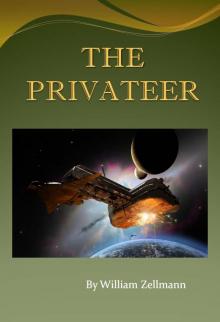 The Privateer
The Privateer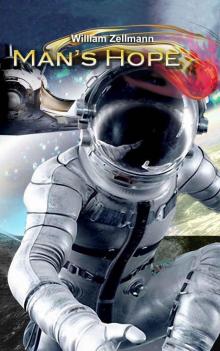 Man's Hope
Man's Hope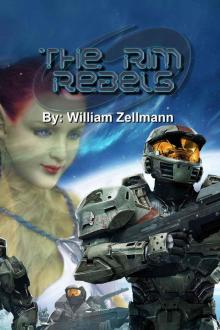 The Rim Rebels
The Rim Rebels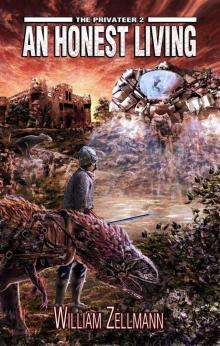 The Privateer 2: AN HONEST LIVING
The Privateer 2: AN HONEST LIVING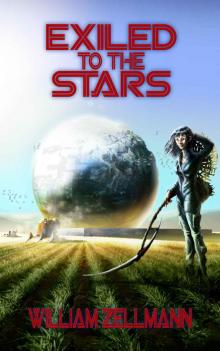 Exiled to the Stars
Exiled to the Stars